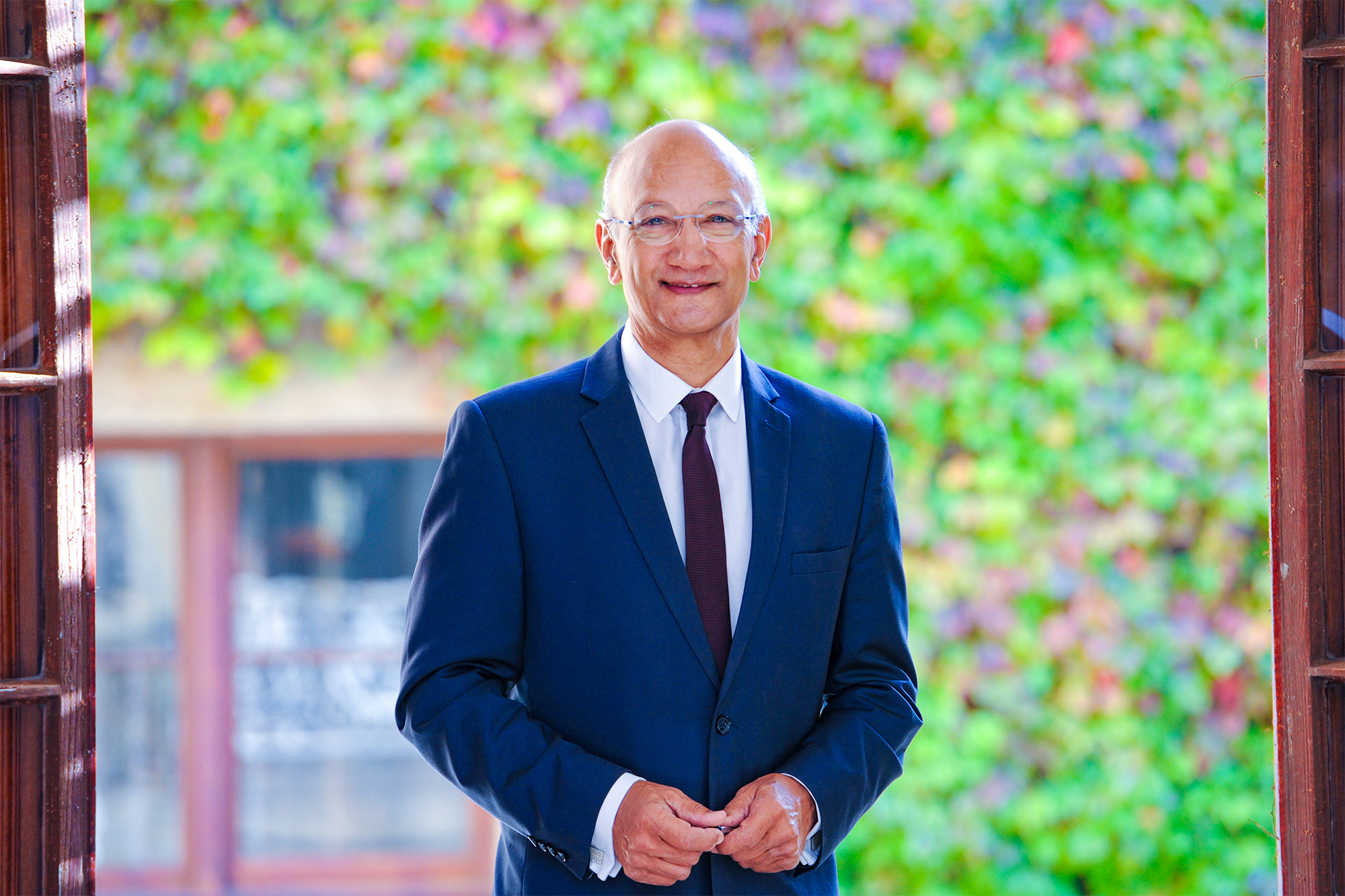Dear colleagues and students
The University of Cape Town (UCT) inducts permanent academic staff members into the prestigious College of Fellows each year as recognition for their original and distinguished academic work that deserves special acknowledgement. Being inducted into the UCT College of Fellows is among the highest accolades an academic staff member can receive.
The four permanent UCT academics who have been awarded a Fellowship this year are Professors Liesl Zühlke, Thomas Scriba, Tom Moultrie and Wendy Burgers.
Professor Liesl Zühlke (Faculty of Health Sciences)
Professor Zühlke is the leading paediatric cardiology clinician scientist in South Africa, the first paediatric cardiologist to achieve a PhD and the only woman full professor of paediatric cardiology in the country. She is an internationally recognised researcher in the fields of rheumatic and congenital heart disease (RHD and CHD) as well as in global health – with over 180 publications, more than 51 000 citations, 11 books and book chapters, and 25 postgraduate supervisions (19 graduated and six enrolled) across multiple disciplines.
She has led or been substantially involved in almost every major RHD research project and intervention since 2010 when she commenced her research work in this area. Her work in RHD spans basic science, clinical research and public health, resulting in significant new knowledge recognised globally. Most importantly, her research, work and impact have resulted in significant and substantial outcomes impacting the health of people: she was instrumental in the World Heart Federation guidelines to diagnose RHD in asymptomatic populations, now adopted across all countries; she published a report on the gaps in evidence-based interventions in RHD patients; and she was a substantial contributor to the passing of a landmark resolution against RHD by the World Health Organization in 2018, following the Addis Ababa communiqué in 2016.
Professor Thomas Scriba (Faculty of Health Sciences)
Professor Scriba is the deputy director of immunology at the South African Tuberculosis Vaccine Initiative (SATVI) in the Institute of Infectious Disease and Molecular Medicine (IDM). His contributions to the critical field of tuberculosis (TB) vaccine development and clinical immunology have been internationally recognised, are unique, innovative and directly translational to clinical and public health applications. His research insights have already made a significant impact on the field of TB vaccinology and have the potential to make a great impact on TB diagnostics.
With a major research focus on vaccine development, he has been a co-investigator on 26 completed clinical trials of nine different TB vaccine candidates and the licensed BCG vaccine, including phase 1b, 2a and 2b trials in infants, adolescents and adults, as well as multiple efficacy trials of TB vaccines, in collaboration with many local and international partners in academia, industry and pharma.
Professor Tom Moultrie (Faculty of Commerce)
Professor Moultrie is a professor of demography whose commitment to socially responsive scholarship is most evident in his significant contributions during the COVID-19 pandemic. He co-authored over 100 weekly reports throughout the COVID-19 pandemic with colleagues from the South African Medical Resource Council and UCT. Here, he made substantial methodological and analytical contributions. This work continues and will play a small but vital role in the proposed National Institute for Pandemic Preparedness and Prevention. In addition, he authored (and then co-authored) over 100 weekly reports for the National Institute for Communicable Diseases on the results of testing for SARS-CoV-2 during the pandemic.
His work has stimulated debate about the discipline of demography, the Sustainable Development Goals (SDGs), and data colonialism. Through his work with the United Nations Sustainable Development Solutions Network (UN-SDSN), he has contributed several think-pieces and policy briefs setting out concerns regarding the SDGs and the rise of data neo-colonialism of the global South by the global North. These debates resonate amongst South African and African scholars and scientists trying to make sense of calls for decolonisation across the academy.
Professor Wendy Burgers (Faculty of Health Sciences)
Professor Burgers is a professor of virology in the Department of Pathology. She obtained a BSc degree, a BSc (Hons) degree and MSc degree with distinction from UCT and a PhD at the University of Cambridge. On her return to South Africa, she was awarded a postdoctoral fellowship from the South African Medical Research Council (SAMRC) and joined the South African AIDS Vaccine Initiative at UCT, developing candidate HIV vaccines. She established an independent research programme on understanding cellular immune responses in HIV infection, funded through a prestigious Wellcome Trust Intermediate Fellowship in Public Health and Tropical Medicine.
She is a viral immunologist globally recognised for her significant contributions to understanding immunity to infectious diseases and their application to vaccine development and protection. She has studied immunity to pathogens causing the three global pandemics of our time: HIV/AIDS, TB and COVID-19. Her recent work has focused on understanding cellular immunity to the SARS-CoV-2 virus after infection and vaccination. She led several high-impact studies describing the strength and duration of immunity to COVID-19 vaccination and infection and the ability of SARS-CoV-2 variants of concern to evade immunity.
The College of Fellows also recognises outstanding scholarly work by young academics who have made significant independent contributions to research in their field, with the College of Fellows Young Researcher Award. The young academics recognised this year are Associate Professors Nastassja Koen and Ursula Rohlwink; and Drs James Keaveney, Kate Webb, Moses Basitere and Portia Malatjie.
Associate Professor Nastassja Koen (Faculty of Health Sciences)
Associate Professor Koen heads the Psychopharmacology and Biological Psychiatry Division in the Department of Psychiatry and Mental Health. She is co-head of the Psychiatric Genetics Group of the Brain-Behaviour Unit at UCT’s Neuroscience Institute, co-director of the SAMRC Unit on Risk and Resilience in Mental Disorders, and incumbent chair of her Departmental Research Committee.
Associate Professor Ursula Rohlwink (Faculty of Health Sciences)
Associate Professor Rohlwink is a Wellcome Trust International Intermediate Fellow based in the African Brain Child Initiative (ABC) in Paediatric Neurosurgery at the Red Cross War Memorial Children’s Hospital and UCT’s Neuroscience Institute. She strongly focuses on high-level research that addresses major clinical challenges facing children in Africa and across the globe. Traumatic brain injury and TB represent two of the greatest childhood burdens of disease. Together with the ABC Initiative, she is committed to investigating how the developing brain responds to injury through trauma and infection by combining the principles of brain physiology, pathophysiology (including immunology, metabolism, and genetics) and neurocritical care to reduce the impact of these diseases on affected children.
Dr James Keaveney (Department of Physics)
Dr Keaveney is the director of the UCT-CERN Research Centre and a senior lecturer in the Department of Physics, which he joined in March 2019. He holds a B2 rating from the National Research Foundation. His research is concerned with understanding the inner workings of nature at the most fundamental level. He uses data from the ATLAS experiment at CERN to pin down the top quark’s properties and ultimately discover evidence of new physics.
Dr Kate Webb (Faculty of Health Sciences)
Dr Webb is a paediatric rheumatologist, clinician scientist and laboratory immunologist. Her work has been published and presented widely, with more than 2 800 citations to date. She aims to train a cohort of multi-disciplinary clinician-researchers with laboratory skills to better represent African children in the global discovery of disease mechanisms and, ultimately, new therapies. She hopes that the real impact of her work will be the improved care for South African and African children with immune mediated disease.
Dr Moses Basitere (Centre for Higher Education Development)
Dr Basitere assumed a senior lecturer role at UCT in 2021 in the Academic Support for Engineering in Cape Town (ASPECT) unit, a Centre for Higher Education Development department. He also joined the UCT Water Research Group in the Civil Engineering Department, leading research in poultry and dairy wastewater. With his background in chemical engineering, he has made substantial contributions in two key research domains: engineering education and water and wastewater treatment. His work lies in his unwavering commitment to fostering collaborative relationships between academia and industry.
Dr Portia Malatjie (Michaelis School of Fine Art)
Dr Malatjie is a senior lecturer in art history and discourse of art at the Michaelis School of Fine Art. She is interested in the articulation of Black sensibilities in South African art and curation. Her theoretical and curatorial research explores African conceptions of blackness through the intersection of sound, spirituality, and Black feminist thought.
The full citations for the new College of Fellows members and Young Researcher Award recipients are available on the UCT News website.
Please join me in congratulating our academics on their remarkable achievements.
Sincerely
Emer Prof Daya Reddy
Vice-Chancellor interim
Read previous communications:
Credit:Source link



